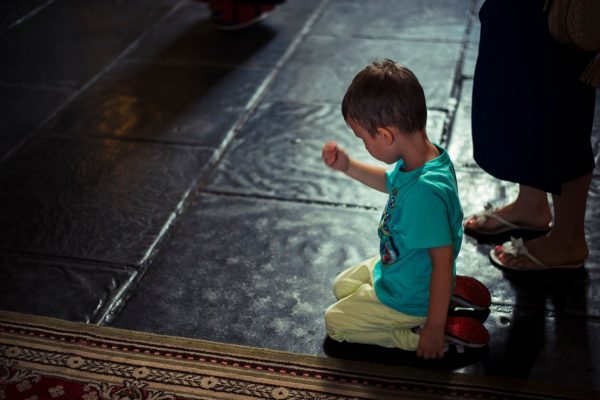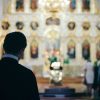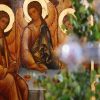Many nations have dedicated a memorial to the “Unknown Soldier.” It is a way of honoring soldiers who quietly sacrificed their lives for their country without receiving the attention of national heroes. Today, as we observe “All Saints Day,” we honor countless of faithful Christians, known and unknown, men and women, who devoted their life to God, and many who sacrificed their lives as martyrs without receiving the attention of the great theologians of the Church.
What is the main trait of a saint? Today’s Epistle reading tells us that the saints were above all persons of faith. The text reads like a song of faith, reciting the triumphs and hardships of the Old Testament saints—Gideon, Barak, David and the others. These saints conquered kingdoms, became mighty in war, established justice, and stopped the mouth of lions. But they also faced severe trials. They suffered chains and imprisonment, mocking and scourging, death and poverty. They were afflicted and ill-treated, wandering over deserts and mountains, and in caves of the earth.
What was their triumph? It was the victory of unshakeable faith in God. Their faith was such that they faced victories and trials with patience and with strength. The text states: they “won strength out of weakness.” Out of tribulations, they won courage, and greater strength, through faith. By their steadfast loyalty and assurance before God, they held firmly to the promise of the coming of Christ and to the hope “that they might rise again to a better life.” Their whole life was a song of faith.
The Feast of all Saints coincides with summer! Especially this year, after the long and stifling epidemic, many of us yearn for the outdoors. School close. Vacations are welcome. We want to travel. We want to visit and spend time with relatives and friends.
At the same time problems do not simply vanish. All of us are deeply pained and grieved by the tragedy in Florida this past week. An apartment building suddenly collapses in the middle of the night. One can imagine the terror, the cries, the injuries and death, and the many still unaccounted for. We sincerely pray for all the victims and their families; and we share their grief and extend a helping hand to the extent that we can. Many other people are still dealing with the death of love ones from the virus, or its lingering side effects. Others encounter job difficulties and financial problems. They worry about themselves and their families. We pray for God’s strength and consolation upon all, especially for those in dire and immediate need.
My dear holy people, these are times for faith: strong, enduring, and compassionate faith. The example of the saints challenges us to live out our faith in all situations and all conditions. Faith is for all times and all seasons. This is the time as individuals and as a nation to work so that we too can “win strength our of weakness.” This is the time to work to establish fuller conditions of justice in our society. This is the time to work to “stop the mouth of shameless lying lions in our public discourse.
From the Epistle reading comes the clarion call: Therefore, surrounded by so great a cloud of witnesses, the saints, let us . . . put aside every weight of distraction, and every sin that clings so closely. Run with perseverance the race set before us, looking to Jesus the pioneer and perfecter of our faith.” Yes, to Jesus, the pioneer and perfecter of our faith, who has promised us: “I will be with you always, to the close of the age” (Mat 28:20). Remember the story of St. Peter who tried to walk on water? When his eyes were on Christ, he was doing alright. But when his gaze fell on the winds and waves, he began to sink and cried out, “Lord, save me!” It’s a lesson to remember.
What is sainthood? What is holiness? Not necessarily the aroma of incense. Not necessarily the wearing of religious clothes and symbols. Holiness is a pure heart filled with the grace of the Holy Spirit. “The pure of heart will see God,” said Jesus. Purity of heart is freedom from inward evil: from grudges, resentments, jealousies, complaints, animosities, and all the rest. A pure heart welcomes the visitation of God’s grace which alone makes for holiness. The whole life’s struggle for sainthood and holiness is fought around the cleansing of the heart from evil and its sanctification by the grace of the Holy Spirit. To the extent that the heart, the inner world of the soul, is cleansed and sanctified by God, to that extent do we have the faith and power of the saints to do whatever God requires of us to do, wherever we are, and by whatever means God has blessed us with.
Who are the saints today? The missionaries in far-away lands? The monastics on Mount Athos? Individual Christians in the Middle East facing persecution and death? The answer is yes, but also that all of us are saints, as a gift of God. No saint ever claimed that she or he sanctified themselves by their own skill or virtue. We are sanctified because Christ died on the Cross to grant us forgiveness and sanctification. We are sanctified because on Pentecost the gift of the Holy Spirit was poured out on the Church to bestow renewal and holiness to believers. We are sanctified because we are all baptized in Christ and have been sealed with the gift of the Holy Spirit. At your baptism, the priest said to each of you: “You were baptized, illuminated, anointed, sanctified, in the name of the Father and of the Son and of the Holy Spirit.”
The early Christians rejoiced in calling each other saints. St. Paul wrote: “To the Church of God which is at Corinth, to those sanctified in Christ Jesus, called to be saints” (1 Cor 1:1-2). To Colossians, he stated: “To the saints and faithful brethren in Christ at Colossae: Grace to you and peace from God our Father” (Col 1:2). And St. Peter in his letter wrote: “You are a chosen race, a royal priesthood, a holy nation, God’s own people, that you may declare the wonderful deeds of Him who called you out of darkness into His marvelous light” (1Pet 2:9). As St. Peter specifies, there is always a purpose, a goal to the gift of sainthood: to declare the wonderful deeds of God and to serve God by loving Him and by serving our neighbors in need.
Does not our Divine Liturgy teach us the same truth that we are all blessed saints? The Divine Liturgy is a spiritual journey into God’s kingdom, God’s sanctifying presence and power here on earth. At the consecration of the Gifts, the priest prays to God: “Send down Your Holy Spirit upon us and upon the gifts here presented.” At Holy Communion the priest lifts up the Eucharistic Gifts and proclaims: “Ta Aghia tois aghiois–The Holy Gifts for the holy people of God.” We are all saints. We are all blessed and sanctified by faith, by baptism, by Holy Communion, by the sacrifice of Christ, by the grace of the Holy Spirit. What then remains? Just this: to honor this gift, and live worthily of Christ, with all our hearts, with all our minds, with all our strength, and with all our lives. Amen.

















